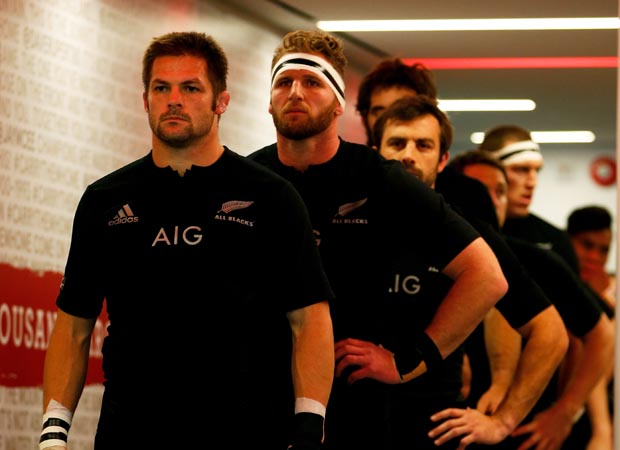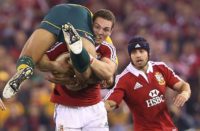 The historical life span of an international rugby captain averages out at six matches, a fact which makes Richie McCaw's unique achievement all the harder to believe.
The historical life span of an international rugby captain averages out at six matches, a fact which makes Richie McCaw's unique achievement all the harder to believe.
New Zealand's perennial leader is currently above average to the tune of 94 Tests and still far from finished despite the unrelenting ferocity of his job over a full decade. His is truly the ultimate Test of endurance and not just in rugby. None of Europe's finest football captains ever lasted that long.
England's two most revered leaders, Billy Wright and Bobby Moore, fell ten matches short of three figures and even the indestructible Brian O'Driscoll called it quits after leading Ireland 84 times.
In an evermore hazardous business, McCaw continues to avoid the traps, on field and off, which have undone some colossal captains over the years. They did so for reasons which had nothing to do with mundane matters like form, fitness and results.
Will Carling found out the hard way that rebranding the then outsized RFU general committee as “57 old farts” caused sufficient offence for the blazers to sack him from the England captaincy, all within weeks of the team's departure for the 1995 World Cup in South Africa.
Feverish diplomatic activity following the resolute refusal of Dean Richards and other senior players to fill the vacancy forced the RFU hierarchy into an embarrassingly swift volte face. Lavish sprays of air freshener cleared up the smell.
McCaw has not been daft enough to pin any accusations of wind-breaking odour on the NZRFU. Neither has there been the faintest whiff of scandal swirling around his career, of the sort which forced Lawrence Dallaglio to resign the England captaincy over drug allegations published by the News Of The World.
Three months later the RFU dropped charges against him before fining him £15,000 for bringing the game into disrepute. Dallaglio being Dallaglio, he fought back and regained the captaincy in between his first and second World Cup finals. That was more than could be said of one of his predecessors, Richard Hill, the scrum-half not to be confused with the wing forward.
After an ugly brawl against Wales at Cardiff Arms Park in 1987, the RFU imposed one-match bans on three of their team (Gareth Chilcott, Graham Dawe, Wade Dooley) for putting it about and also punished Hill as the captain.
In their naivety, they then expected their Welsh counterparts to make a similar example of their miscreants. The WRU's refusal to do anything of the sort left the RFU marooned on the moral high ground, up the creek without a paddle.
Other captains risked everything by taking strike action for the greater good of those at their command. While Philippe Saint-Andre threatened to do so on behalf of France in the early Nineties, England actually downed tools and walked out before a home match against Argentina in protest at the RFU's failure to implement a new pay deal.
No captain, amateur or professional, this century or last, can have waged more of a constant battle against his Union than Mike Watkins did throughout 1984. As well as the “petty politics”, the firebrand Cardiff hooker kept running into accidents.
Not all were of his own making, like the puncture on the coach taking the Wales team from their Maidenhead hotel to Twickenham for the England match that year. Watkins claims he got out and changed the wheel himself because he feared the team would miss the kick-off waiting for the breakdown lorry to appear.
Already fired up, Watkins became positively enraged at the sight of Twickenham Man scoffing and quaffing in the West car park.
He dedicated his team's win that day to the striking Welsh miners, saying: “It would have been great if we'd marched onto the field wearing miners' helmets and carrying Davy lamps.”
Not surprisingly, ‘Spikey' jumped before he could be pushed. Four years later another Eighties Wales captain, Jonathan Davies, did exactly the same, taking refuge in Rugby League amid mutterings over his captaincy in the home defeat by Romania.
David Sole suffered a similar behind-his-back treatment within months of initiating the famous slow walk in leading Scotland to their wonderful Grand Slam clincher against England in 1990. The ‘back-biting' drove Sole to quit two years later at the tender age of 30, years ahead of his time.
Captaincy can seriously damage your health as Gareth Thomas will testify. After a television appearance which turned out to be less an interview and more a rant over his alleged role in the overthrow of Wales coach Mike Ruddock, Thomas suffered a mini-stroke shortly after the programme.
If Steve Borthwick is a classic example of an English captain dumped despite yeoman service to the cause, Wayne ‘Buck' Shelford was dumped from an even greater height by New Zealand in 1990 despite never having lost any of his 31 matches in on-field charge of the All Blacks.
Imagine, then, what would have happened to McCaw had he lost that first match as captain in Cardiff ten years ago instead of winning it by a point.
*This article was first published in The Rugby Paper on November 23.




























Pingback: additional resources